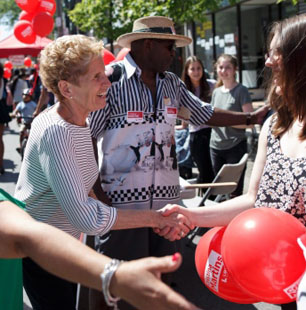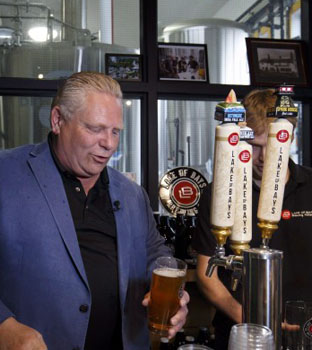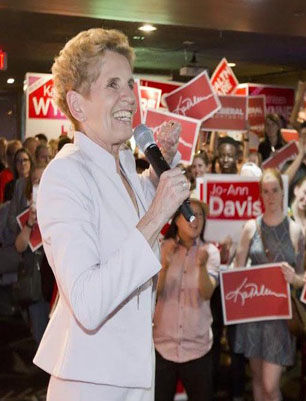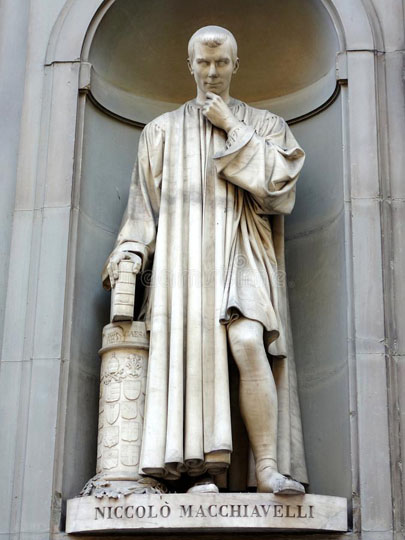Ontario election 2018, IV : Could unlikely Liberal blip at the end lead to bold experiment in challenging times?
Jun 3rd, 2018 | By Citizen X | Category: In Brief

Kathleen Wynne and Andrea Horwath at discussion on electoral absenteeism among youth and minority groups in Toronto, February 2018. (CP/Chris Young.)
OLD STREETCAR SUBURBS. SUNDAY, JUNE 3, 2018. Yesterday was a beautiful sunny afternoon. At one point the sound of birds in the yard reminded me the world will still be beautiful, no matter what happens in the Ontario election on Thursday, June 7.
And the announcement on TVÂ – in which an “emotional Kathleen Wynne … acknowledged that she will no longer be premier after the June 7 election and encouraged voters to elect Liberal candidates to prevent the NDP or PCs from securing a majority” – may have gone to my head.
But I have concluded I like the idea myself, for my own hidden-agenda reasons.
Like more than a few Ontario voters I’ve long believed the Liberals and New Democrats should do more to co-operate at Queen’s Park – or in Ottawa for that matter. (As bizarre as that may seem, in the midst of our own local version of the early 21st century tribalist political culture, north of the Great Lakes.)
Without going into great (or even minor) detail, I agree with those who think each party, New Democrat and Liberal, has important virtues that the other lacks.
They work best together. And the people who agree with me begin with my TV-watching partner, such that the view in my immediate surroundings is unanimous.
Kathleen Wynne’s last Machiavellian moment?
 Our very brief golden age was the Liberal-NDP Accord of 1985, which finally brought down the 42-year Progressive Conservative dynasty in Canada’s most populous province. (Forget about the merely 15 consecutive years of Liberal government the province is said to be so weary of now!)
Our very brief golden age was the Liberal-NDP Accord of 1985, which finally brought down the 42-year Progressive Conservative dynasty in Canada’s most populous province. (Forget about the merely 15 consecutive years of Liberal government the province is said to be so weary of now!)
This was followed by the Peterson Liberal government, 1987—1990, the Rae New Democrat government, 1990—1995, the Mike Harris-Ernie Eves Conservative interregnum, 1995-2003, the McGuinty Liberal government, 2003-2013, and the Wynne Liberal government, 2013—2018.
Back on May 14, 2018 Lorrie Goldstein at the Toronto Sun opined on Twitter : “The way I’d put it is that unless the PCs win a clear majority of 63 of the Legislature’s 124 seats on June 7, it will likely be either an NDP majority or minority government.” And I think this still makes sense.
Put another way, I agree that only a very “major” Conservative minority government (to borrow a term coined by the McGuinty Liberals in 2011) will be able to survive for any length of time in the legislature.
A major minority government is one where the governing party has a much greater plurality of seats than either of the other two parties : eg PC 60, NDP 40, LIB 24 – and, say, the largest share of the popular vote.
Lorrie Goldstein has also tweeted recently about a variation on the theme, where the Ford Nation Conservatives win, say, as many as 61 seats, and then entice a few more right-wing Liberals to cross the floor with offers of cabinet jobs, etc.
Of course, there are those who argue the premier is being high-minded when she acknowledges she will no longer be premier after the June 7 election, and encourages voters to elect Liberal candidates to prevent the NDP or PCs from securing a majority government. And then there are those who argue she is just being blatantly self-interested (and “arrogant” etc).
I’d say both motives are in play. Kathleen Wynne has been both the practical idealist in government who puts progressive principles first, and a keen political player (who knows how to bring ideals to life, some would say).
Others would argue her keen political player side has been her downfall. Many who have not visited Florence to see the building where Niccolo Machiavelli (1469—1527) once worked (and his statue outside the Uffizi Gallery) don’t like to think these two things can somehow be combined (or even must be, for ultimate public policy success).
Setting Ontario back several centuries, at the very least.

His one redeeming feature : Buck a beer etc? Doug Ford campaigning at Lake of Bays Brewing Company in Baysville, Ont., on Saturday, May 19, 2018. THE CANADIAN PRESS/Cole Burston.
Whatever else, to me it is one of the great glories of Kathleen Wynne’s time as premier, 2013—2018, that she is finally going out on an innovative note that highlights both essential sides of her political personality.
In any event I do think myself that an NDP minority government supported by the Wynne Liberals via something like the 1985 Accord or otherwise (with the party roles reversed, so to speak) would be the best possible outcome of Ontario election 2018.
If you live as I do in a riding where no Tory has been elected to the Ontario legislature since 1971 (and where the seat has mostly been held by the NDP since then), voting Liberal rather than NDP is very unlikely to elect the PCs, as NDP partisans are of course bound to claim.
Province-wide there is perhaps some risk that voting Liberal could lead to a PC major minority government, as illustrated above, with at least some prospects of a somewhat longer life. But something closer to what actually happened in 1985 would work just fine.
Then, in another legislature where 63 seats was the majority, the result on election day was : PCs 52 seats with 37% of the popular vote ; LIBs 48 seats with 38% of the vote ; NDP 25 seats with 24% of the vote. Again, switch positions with the NDP and LIBs and this to me would be an ideal outcome for Ontario election 2018.
Will it happen? I’d probably agree with many outspoken experts that the most likely answer here is probably not.
But the prospect Kathleen Wynne has now underlined so boldly has at least made the final stages of this unusual campaign especially interesting for Ontario voters like me (and my TV watching partner).

Kathleen Wynne campaigning for Liberal hopeful Jo-Ann Davis in Toronto’s University-Rosedale riding. Some say this seat will go NDP on June 7. Others urge Jo-Ann Davis deserves to win.
I should perhaps also finally just note yet again that, unlike some of Lorrie Goldstein’s Twitter friends, I would not be deeply unhappy if the “marxists” in Andrea Horwath’s NDP finally did win a majority government on June 7, as also now recommended by the Toronto Star.
And I do think that any government headed by a Premier Doug Ford – even with Christine Elliott and Brian Mulroney’s daughter in the cabinet – will almost certainly set Ontario back several centuries, at the very least.
(O and btw, today’s latest June 3 update of the CBC Poll Tracker reports current public polling averages at NDP 37%, PC 36%, LIB 20%. These are fairly close to the 1985 numbers above, if you reverse the Liberal and New Democrat results. Note too that since the last Poll Tracker update, the PC numbers have gone down 1.1%. The NDP numbers have stayed the same. And the Liberals have gone up 1.2%. Perhaps all accidental, but interesting nonetheless?)

